Critique of Post-World War II Development Theories and Practices
VerifiedAdded on 2023/01/03
|6
|1258
|75
Essay
AI Summary
This essay provides a critical review of the evolution of development strategies, theories, and practices from the aftermath of World War II to the present day. It begins with a brief overview of the war's impact on global political and social structures, setting the stage for the examination of post-war development initiatives. The essay explores the emergence of key development theories such as modernisation, dependency, and neo-liberalism, and their respective impacts on various countries. It considers the influence of the Cold War and globalization on international development, and the role of organizations like the United Nations, World Bank, and International Monetary Fund. The analysis covers the shift from rebuilding war-torn countries to supporting newly independent nations, and the ongoing debates surrounding economic, political, and social aspects of development, including the role of capitalism and the impact of various ideologies. The essay concludes by highlighting the changes in the international development landscape and the forging of a common identity post-war.
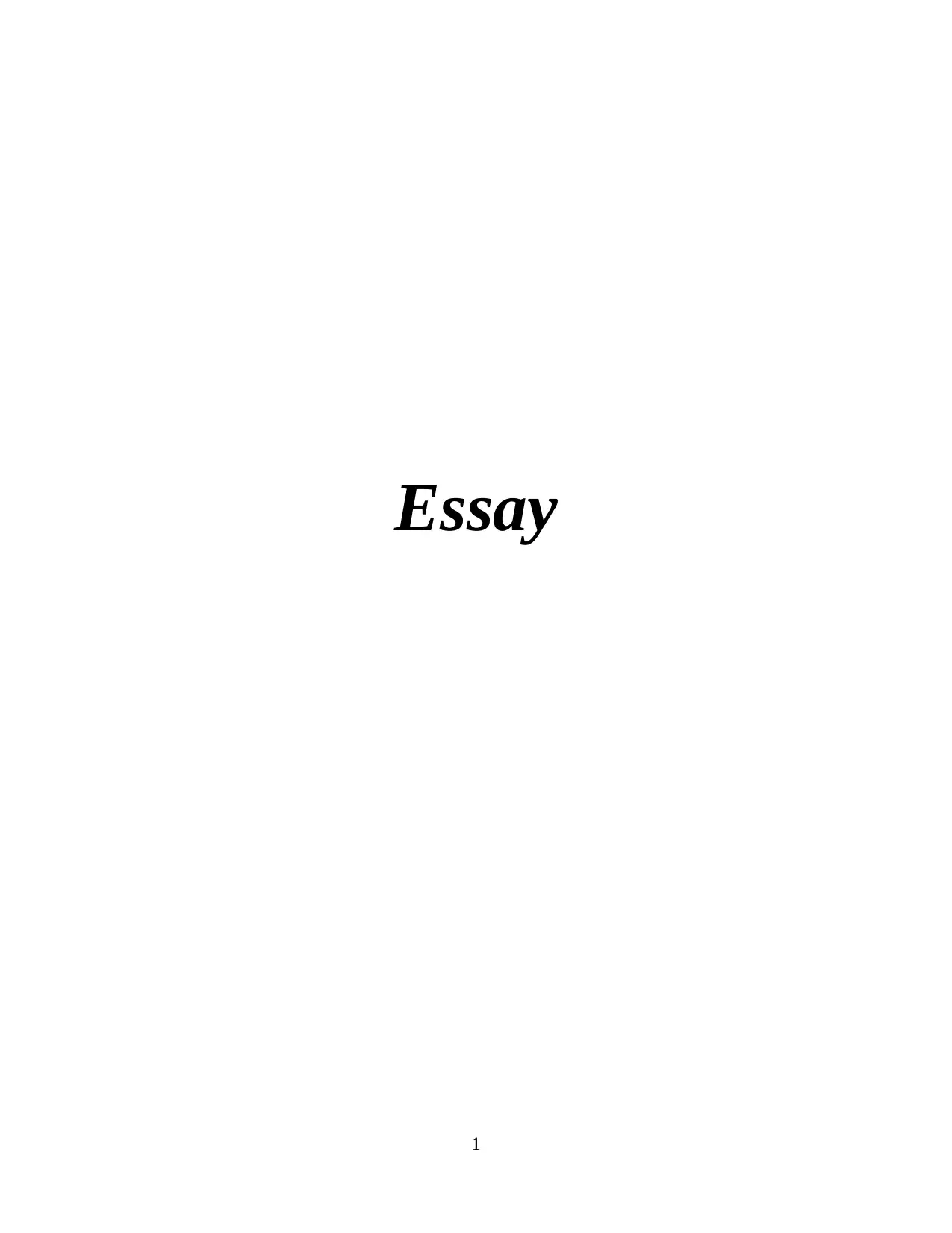
Essay
1
1
Paraphrase This Document
Need a fresh take? Get an instant paraphrase of this document with our AI Paraphraser
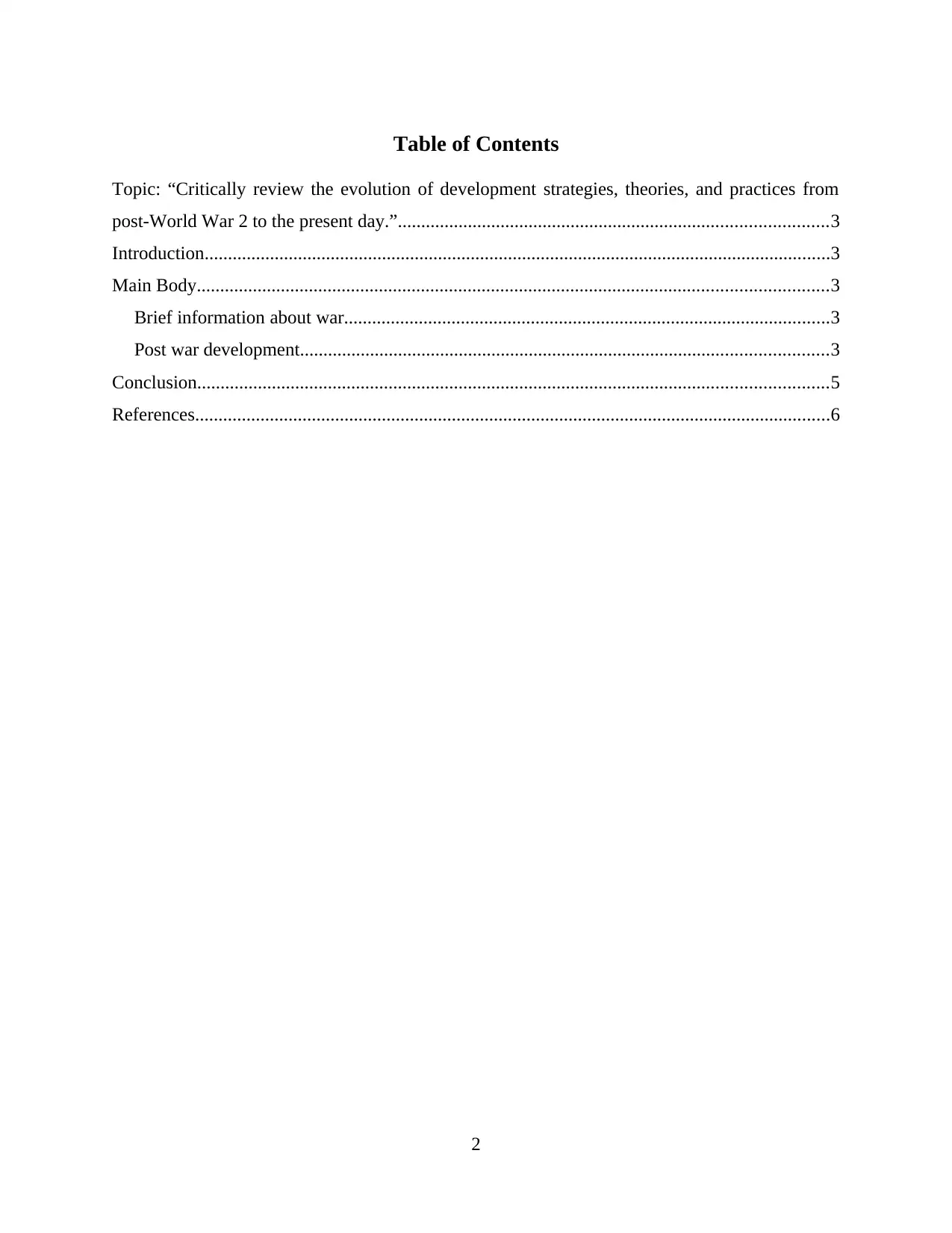
Table of Contents
Topic: “Critically review the evolution of development strategies, theories, and practices from
post-World War 2 to the present day.”............................................................................................3
Introduction......................................................................................................................................3
Main Body.......................................................................................................................................3
Brief information about war........................................................................................................3
Post war development.................................................................................................................3
Conclusion.......................................................................................................................................5
References........................................................................................................................................6
2
Topic: “Critically review the evolution of development strategies, theories, and practices from
post-World War 2 to the present day.”............................................................................................3
Introduction......................................................................................................................................3
Main Body.......................................................................................................................................3
Brief information about war........................................................................................................3
Post war development.................................................................................................................3
Conclusion.......................................................................................................................................5
References........................................................................................................................................6
2
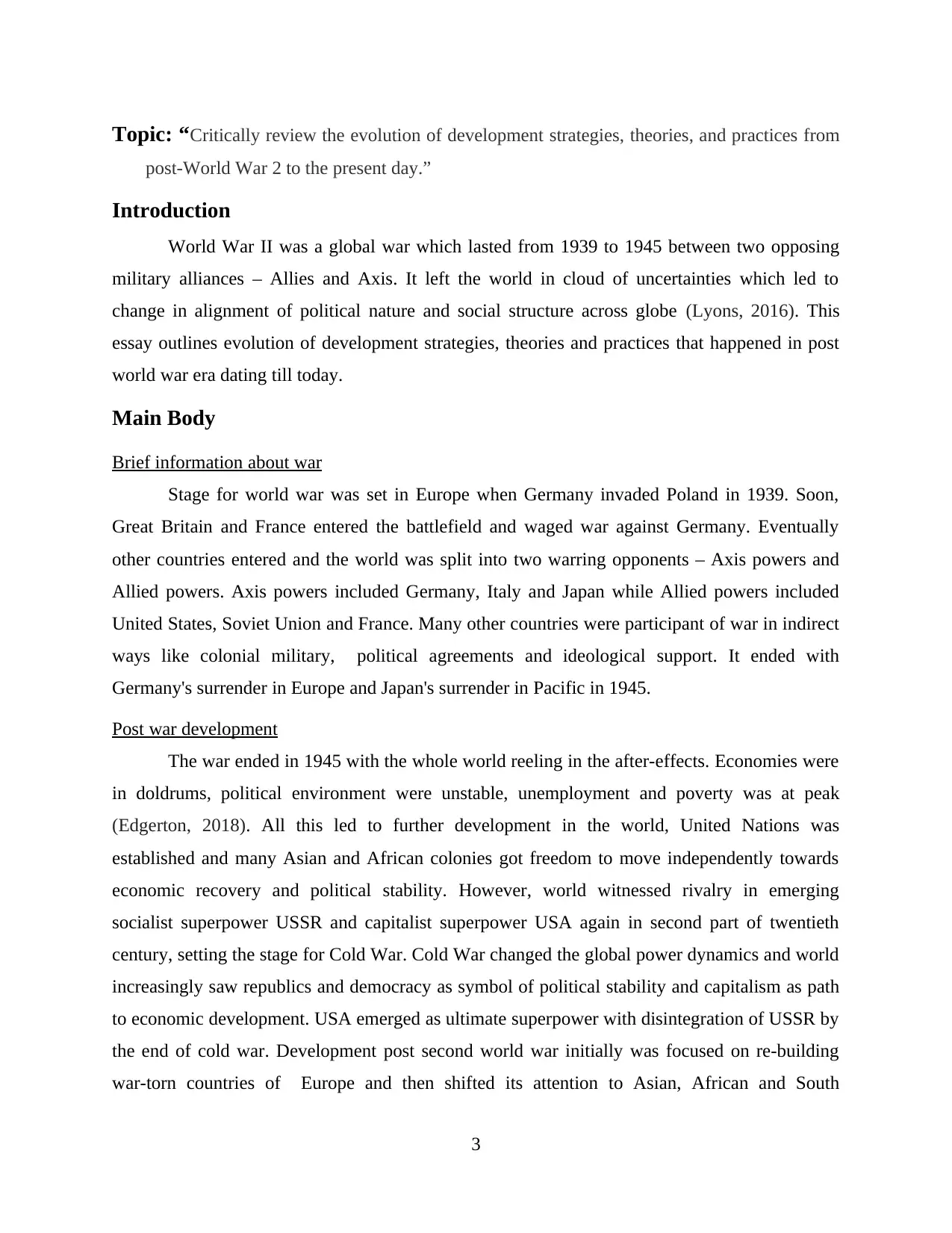
Topic: “Critically review the evolution of development strategies, theories, and practices from
post-World War 2 to the present day.”
Introduction
World War II was a global war which lasted from 1939 to 1945 between two opposing
military alliances – Allies and Axis. It left the world in cloud of uncertainties which led to
change in alignment of political nature and social structure across globe (Lyons, 2016). This
essay outlines evolution of development strategies, theories and practices that happened in post
world war era dating till today.
Main Body
Brief information about war
Stage for world war was set in Europe when Germany invaded Poland in 1939. Soon,
Great Britain and France entered the battlefield and waged war against Germany. Eventually
other countries entered and the world was split into two warring opponents – Axis powers and
Allied powers. Axis powers included Germany, Italy and Japan while Allied powers included
United States, Soviet Union and France. Many other countries were participant of war in indirect
ways like colonial military, political agreements and ideological support. It ended with
Germany's surrender in Europe and Japan's surrender in Pacific in 1945.
Post war development
The war ended in 1945 with the whole world reeling in the after-effects. Economies were
in doldrums, political environment were unstable, unemployment and poverty was at peak
(Edgerton, 2018). All this led to further development in the world, United Nations was
established and many Asian and African colonies got freedom to move independently towards
economic recovery and political stability. However, world witnessed rivalry in emerging
socialist superpower USSR and capitalist superpower USA again in second part of twentieth
century, setting the stage for Cold War. Cold War changed the global power dynamics and world
increasingly saw republics and democracy as symbol of political stability and capitalism as path
to economic development. USA emerged as ultimate superpower with disintegration of USSR by
the end of cold war. Development post second world war initially was focused on re-building
war-torn countries of Europe and then shifted its attention to Asian, African and South
3
post-World War 2 to the present day.”
Introduction
World War II was a global war which lasted from 1939 to 1945 between two opposing
military alliances – Allies and Axis. It left the world in cloud of uncertainties which led to
change in alignment of political nature and social structure across globe (Lyons, 2016). This
essay outlines evolution of development strategies, theories and practices that happened in post
world war era dating till today.
Main Body
Brief information about war
Stage for world war was set in Europe when Germany invaded Poland in 1939. Soon,
Great Britain and France entered the battlefield and waged war against Germany. Eventually
other countries entered and the world was split into two warring opponents – Axis powers and
Allied powers. Axis powers included Germany, Italy and Japan while Allied powers included
United States, Soviet Union and France. Many other countries were participant of war in indirect
ways like colonial military, political agreements and ideological support. It ended with
Germany's surrender in Europe and Japan's surrender in Pacific in 1945.
Post war development
The war ended in 1945 with the whole world reeling in the after-effects. Economies were
in doldrums, political environment were unstable, unemployment and poverty was at peak
(Edgerton, 2018). All this led to further development in the world, United Nations was
established and many Asian and African colonies got freedom to move independently towards
economic recovery and political stability. However, world witnessed rivalry in emerging
socialist superpower USSR and capitalist superpower USA again in second part of twentieth
century, setting the stage for Cold War. Cold War changed the global power dynamics and world
increasingly saw republics and democracy as symbol of political stability and capitalism as path
to economic development. USA emerged as ultimate superpower with disintegration of USSR by
the end of cold war. Development post second world war initially was focused on re-building
war-torn countries of Europe and then shifted its attention to Asian, African and South
3
⊘ This is a preview!⊘
Do you want full access?
Subscribe today to unlock all pages.

Trusted by 1+ million students worldwide
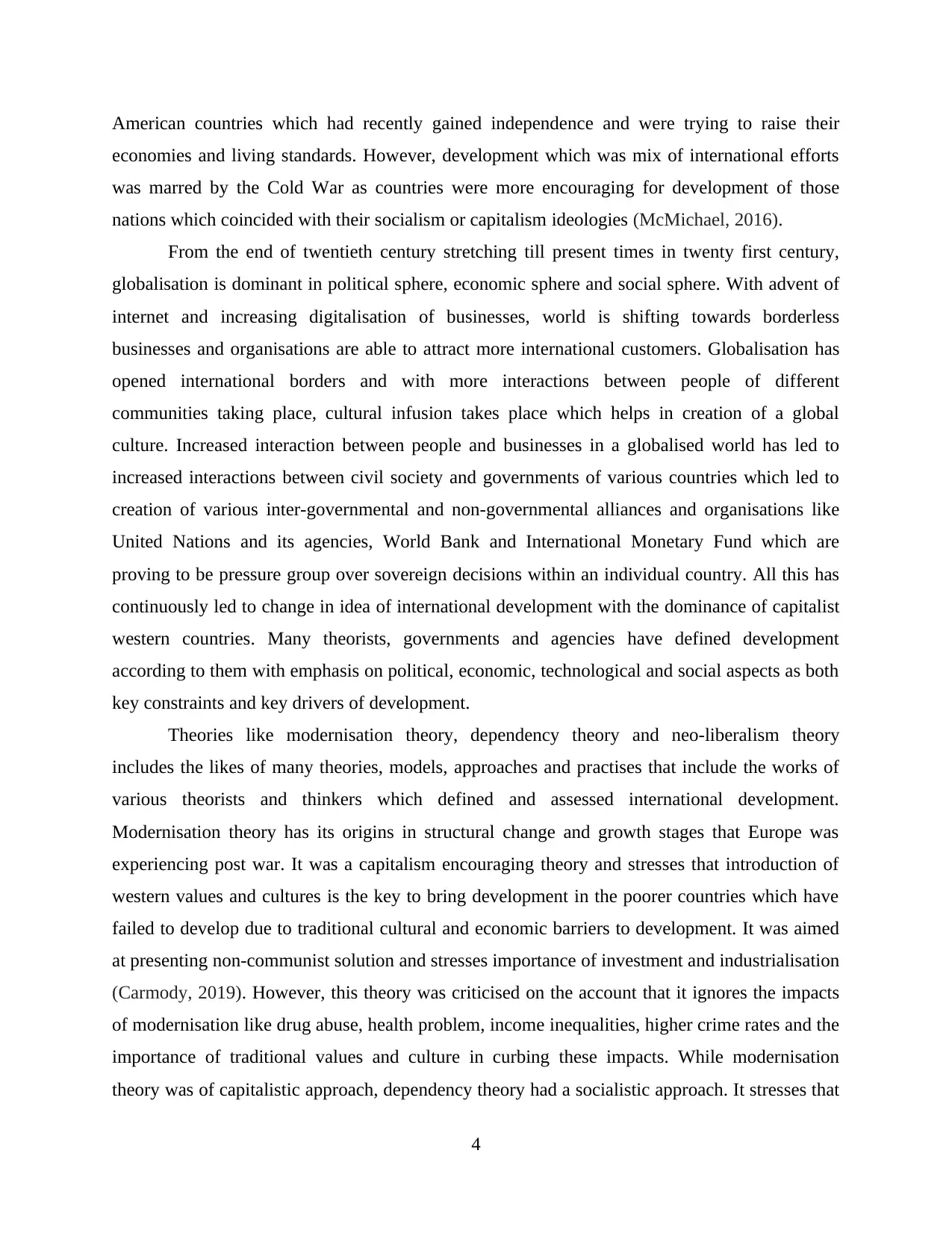
American countries which had recently gained independence and were trying to raise their
economies and living standards. However, development which was mix of international efforts
was marred by the Cold War as countries were more encouraging for development of those
nations which coincided with their socialism or capitalism ideologies (McMichael, 2016).
From the end of twentieth century stretching till present times in twenty first century,
globalisation is dominant in political sphere, economic sphere and social sphere. With advent of
internet and increasing digitalisation of businesses, world is shifting towards borderless
businesses and organisations are able to attract more international customers. Globalisation has
opened international borders and with more interactions between people of different
communities taking place, cultural infusion takes place which helps in creation of a global
culture. Increased interaction between people and businesses in a globalised world has led to
increased interactions between civil society and governments of various countries which led to
creation of various inter-governmental and non-governmental alliances and organisations like
United Nations and its agencies, World Bank and International Monetary Fund which are
proving to be pressure group over sovereign decisions within an individual country. All this has
continuously led to change in idea of international development with the dominance of capitalist
western countries. Many theorists, governments and agencies have defined development
according to them with emphasis on political, economic, technological and social aspects as both
key constraints and key drivers of development.
Theories like modernisation theory, dependency theory and neo-liberalism theory
includes the likes of many theories, models, approaches and practises that include the works of
various theorists and thinkers which defined and assessed international development.
Modernisation theory has its origins in structural change and growth stages that Europe was
experiencing post war. It was a capitalism encouraging theory and stresses that introduction of
western values and cultures is the key to bring development in the poorer countries which have
failed to develop due to traditional cultural and economic barriers to development. It was aimed
at presenting non-communist solution and stresses importance of investment and industrialisation
(Carmody, 2019). However, this theory was criticised on the account that it ignores the impacts
of modernisation like drug abuse, health problem, income inequalities, higher crime rates and the
importance of traditional values and culture in curbing these impacts. While modernisation
theory was of capitalistic approach, dependency theory had a socialistic approach. It stresses that
4
economies and living standards. However, development which was mix of international efforts
was marred by the Cold War as countries were more encouraging for development of those
nations which coincided with their socialism or capitalism ideologies (McMichael, 2016).
From the end of twentieth century stretching till present times in twenty first century,
globalisation is dominant in political sphere, economic sphere and social sphere. With advent of
internet and increasing digitalisation of businesses, world is shifting towards borderless
businesses and organisations are able to attract more international customers. Globalisation has
opened international borders and with more interactions between people of different
communities taking place, cultural infusion takes place which helps in creation of a global
culture. Increased interaction between people and businesses in a globalised world has led to
increased interactions between civil society and governments of various countries which led to
creation of various inter-governmental and non-governmental alliances and organisations like
United Nations and its agencies, World Bank and International Monetary Fund which are
proving to be pressure group over sovereign decisions within an individual country. All this has
continuously led to change in idea of international development with the dominance of capitalist
western countries. Many theorists, governments and agencies have defined development
according to them with emphasis on political, economic, technological and social aspects as both
key constraints and key drivers of development.
Theories like modernisation theory, dependency theory and neo-liberalism theory
includes the likes of many theories, models, approaches and practises that include the works of
various theorists and thinkers which defined and assessed international development.
Modernisation theory has its origins in structural change and growth stages that Europe was
experiencing post war. It was a capitalism encouraging theory and stresses that introduction of
western values and cultures is the key to bring development in the poorer countries which have
failed to develop due to traditional cultural and economic barriers to development. It was aimed
at presenting non-communist solution and stresses importance of investment and industrialisation
(Carmody, 2019). However, this theory was criticised on the account that it ignores the impacts
of modernisation like drug abuse, health problem, income inequalities, higher crime rates and the
importance of traditional values and culture in curbing these impacts. While modernisation
theory was of capitalistic approach, dependency theory had a socialistic approach. It stresses that
4
Paraphrase This Document
Need a fresh take? Get an instant paraphrase of this document with our AI Paraphraser
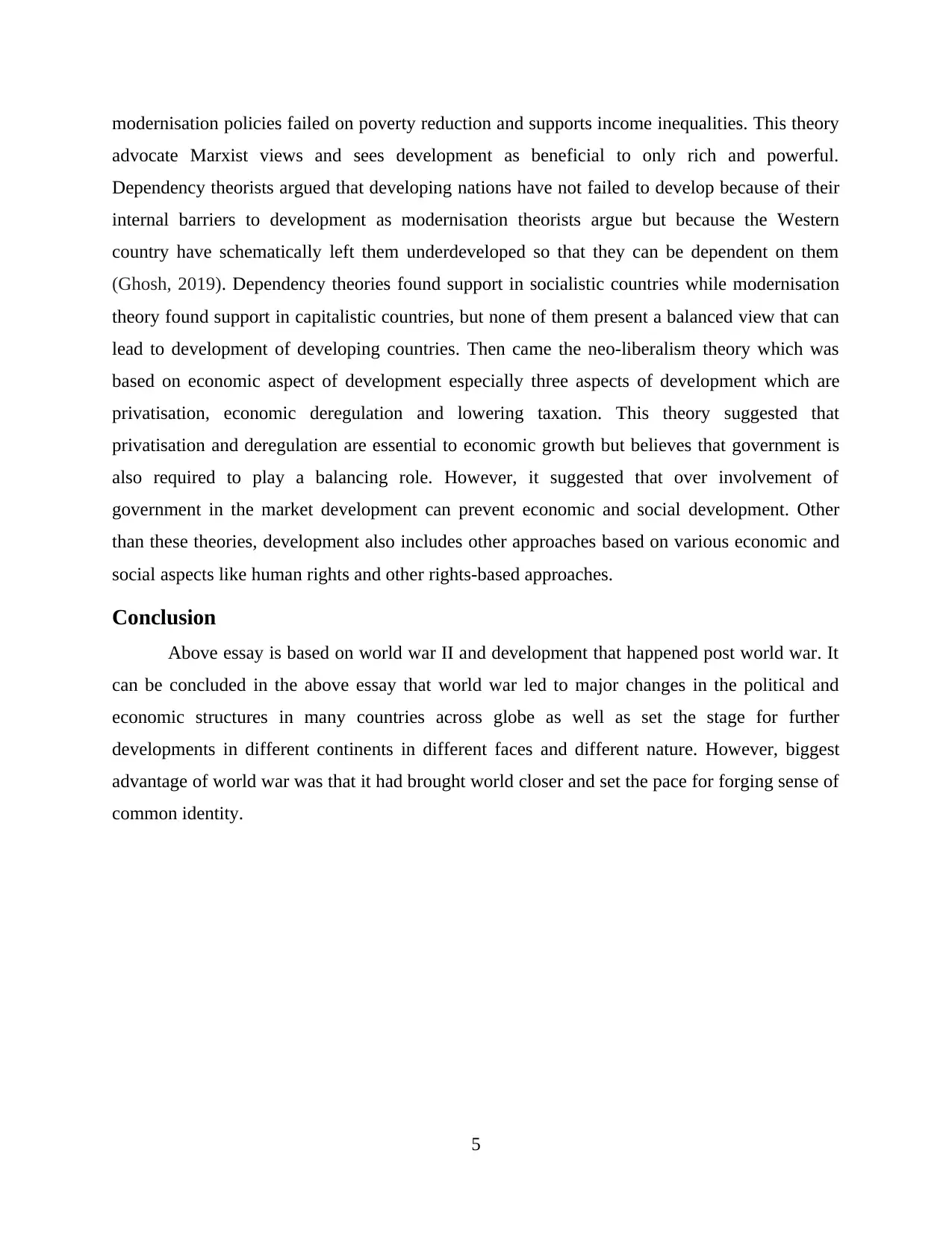
modernisation policies failed on poverty reduction and supports income inequalities. This theory
advocate Marxist views and sees development as beneficial to only rich and powerful.
Dependency theorists argued that developing nations have not failed to develop because of their
internal barriers to development as modernisation theorists argue but because the Western
country have schematically left them underdeveloped so that they can be dependent on them
(Ghosh, 2019). Dependency theories found support in socialistic countries while modernisation
theory found support in capitalistic countries, but none of them present a balanced view that can
lead to development of developing countries. Then came the neo-liberalism theory which was
based on economic aspect of development especially three aspects of development which are
privatisation, economic deregulation and lowering taxation. This theory suggested that
privatisation and deregulation are essential to economic growth but believes that government is
also required to play a balancing role. However, it suggested that over involvement of
government in the market development can prevent economic and social development. Other
than these theories, development also includes other approaches based on various economic and
social aspects like human rights and other rights-based approaches.
Conclusion
Above essay is based on world war II and development that happened post world war. It
can be concluded in the above essay that world war led to major changes in the political and
economic structures in many countries across globe as well as set the stage for further
developments in different continents in different faces and different nature. However, biggest
advantage of world war was that it had brought world closer and set the pace for forging sense of
common identity.
5
advocate Marxist views and sees development as beneficial to only rich and powerful.
Dependency theorists argued that developing nations have not failed to develop because of their
internal barriers to development as modernisation theorists argue but because the Western
country have schematically left them underdeveloped so that they can be dependent on them
(Ghosh, 2019). Dependency theories found support in socialistic countries while modernisation
theory found support in capitalistic countries, but none of them present a balanced view that can
lead to development of developing countries. Then came the neo-liberalism theory which was
based on economic aspect of development especially three aspects of development which are
privatisation, economic deregulation and lowering taxation. This theory suggested that
privatisation and deregulation are essential to economic growth but believes that government is
also required to play a balancing role. However, it suggested that over involvement of
government in the market development can prevent economic and social development. Other
than these theories, development also includes other approaches based on various economic and
social aspects like human rights and other rights-based approaches.
Conclusion
Above essay is based on world war II and development that happened post world war. It
can be concluded in the above essay that world war led to major changes in the political and
economic structures in many countries across globe as well as set the stage for further
developments in different continents in different faces and different nature. However, biggest
advantage of world war was that it had brought world closer and set the pace for forging sense of
common identity.
5
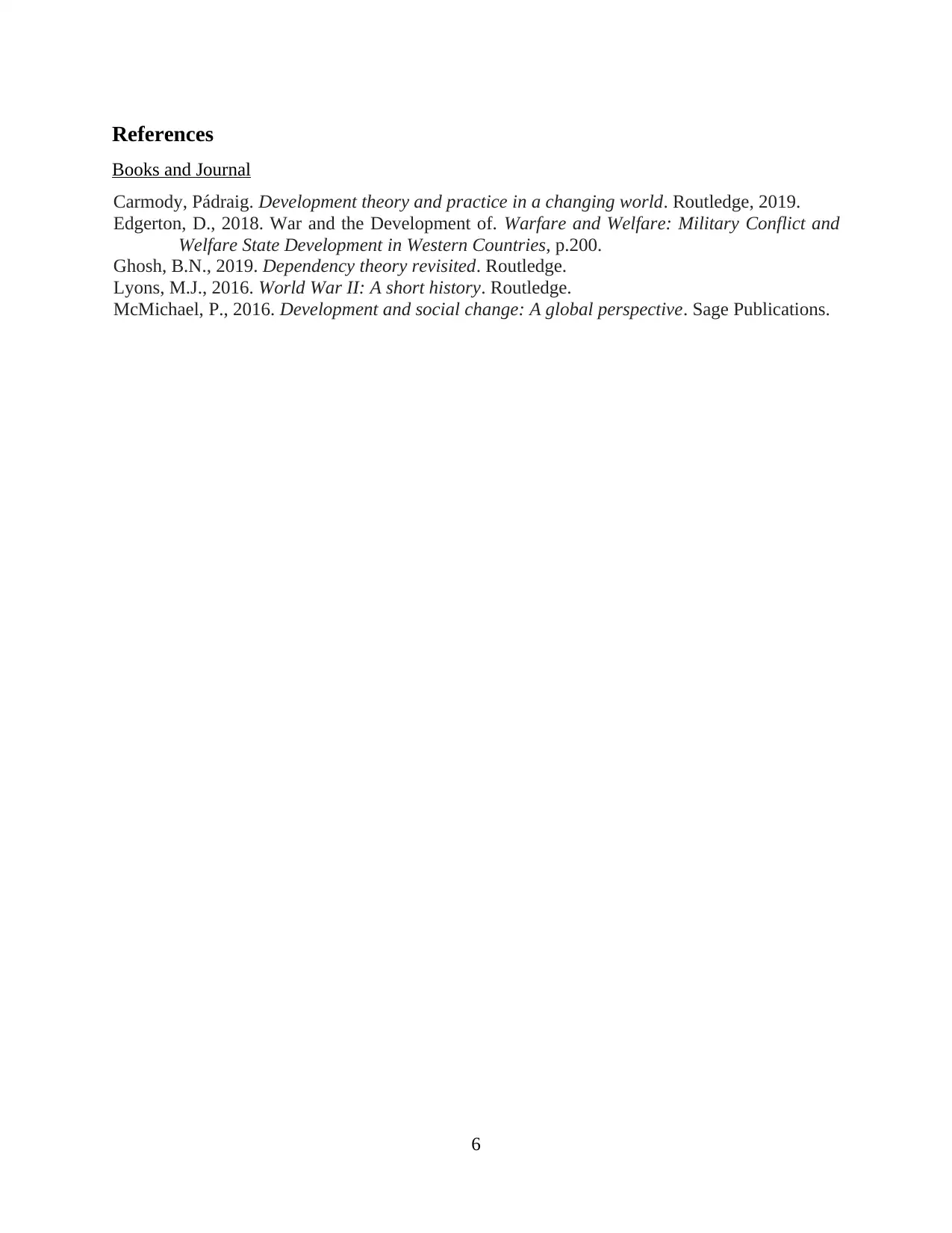
References
Books and Journal
Carmody, Pádraig. Development theory and practice in a changing world. Routledge, 2019.
Edgerton, D., 2018. War and the Development of. Warfare and Welfare: Military Conflict and
Welfare State Development in Western Countries, p.200.
Ghosh, B.N., 2019. Dependency theory revisited. Routledge.
Lyons, M.J., 2016. World War II: A short history. Routledge.
McMichael, P., 2016. Development and social change: A global perspective. Sage Publications.
6
Books and Journal
Carmody, Pádraig. Development theory and practice in a changing world. Routledge, 2019.
Edgerton, D., 2018. War and the Development of. Warfare and Welfare: Military Conflict and
Welfare State Development in Western Countries, p.200.
Ghosh, B.N., 2019. Dependency theory revisited. Routledge.
Lyons, M.J., 2016. World War II: A short history. Routledge.
McMichael, P., 2016. Development and social change: A global perspective. Sage Publications.
6
⊘ This is a preview!⊘
Do you want full access?
Subscribe today to unlock all pages.

Trusted by 1+ million students worldwide
1 out of 6
Related Documents
Your All-in-One AI-Powered Toolkit for Academic Success.
+13062052269
info@desklib.com
Available 24*7 on WhatsApp / Email
![[object Object]](/_next/static/media/star-bottom.7253800d.svg)
Unlock your academic potential
Copyright © 2020–2026 A2Z Services. All Rights Reserved. Developed and managed by ZUCOL.





